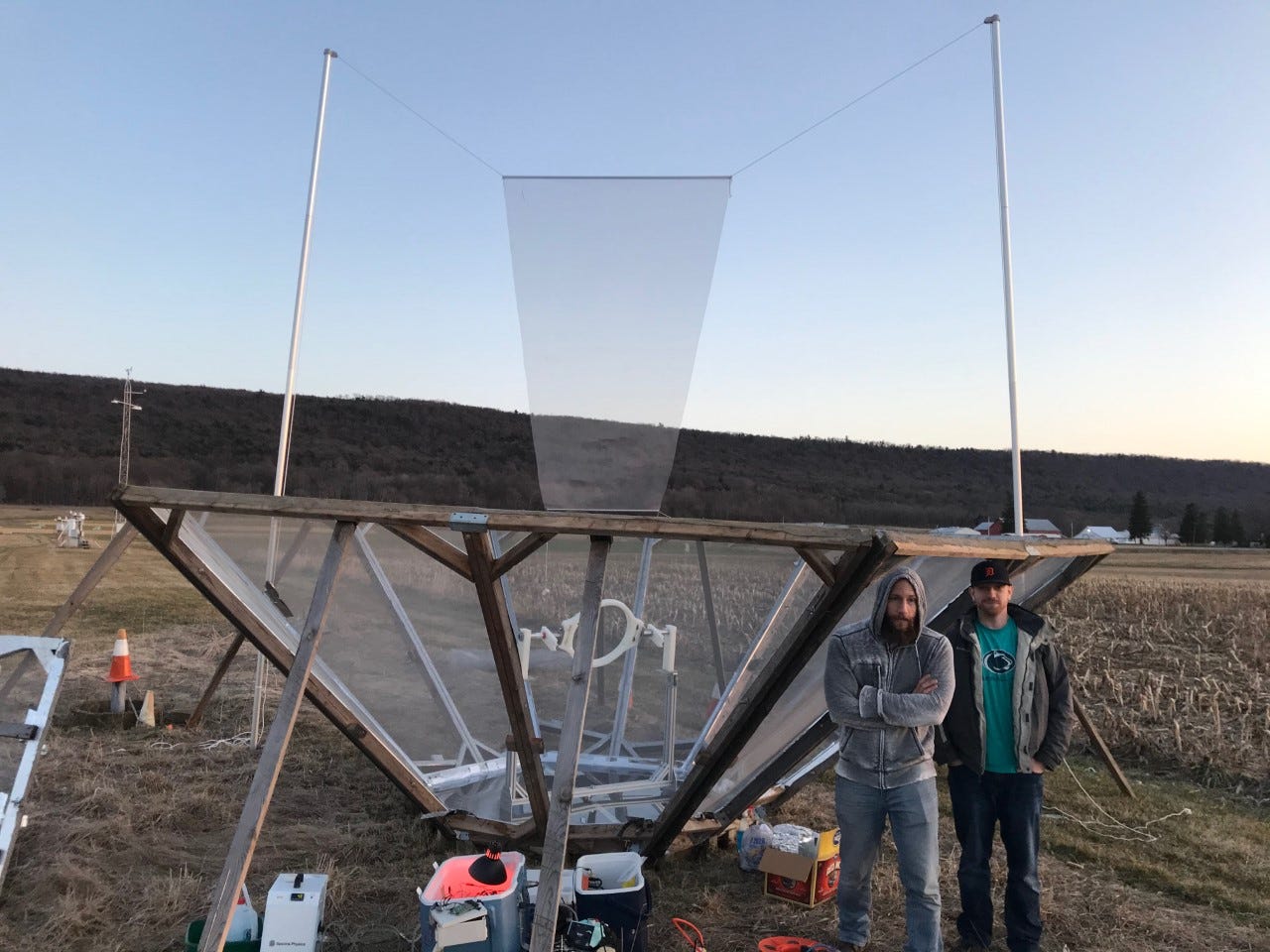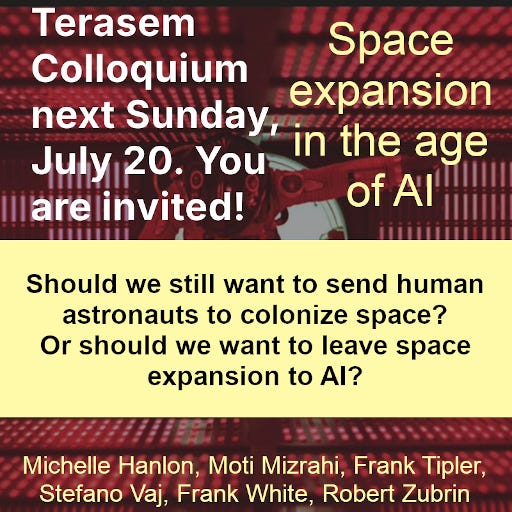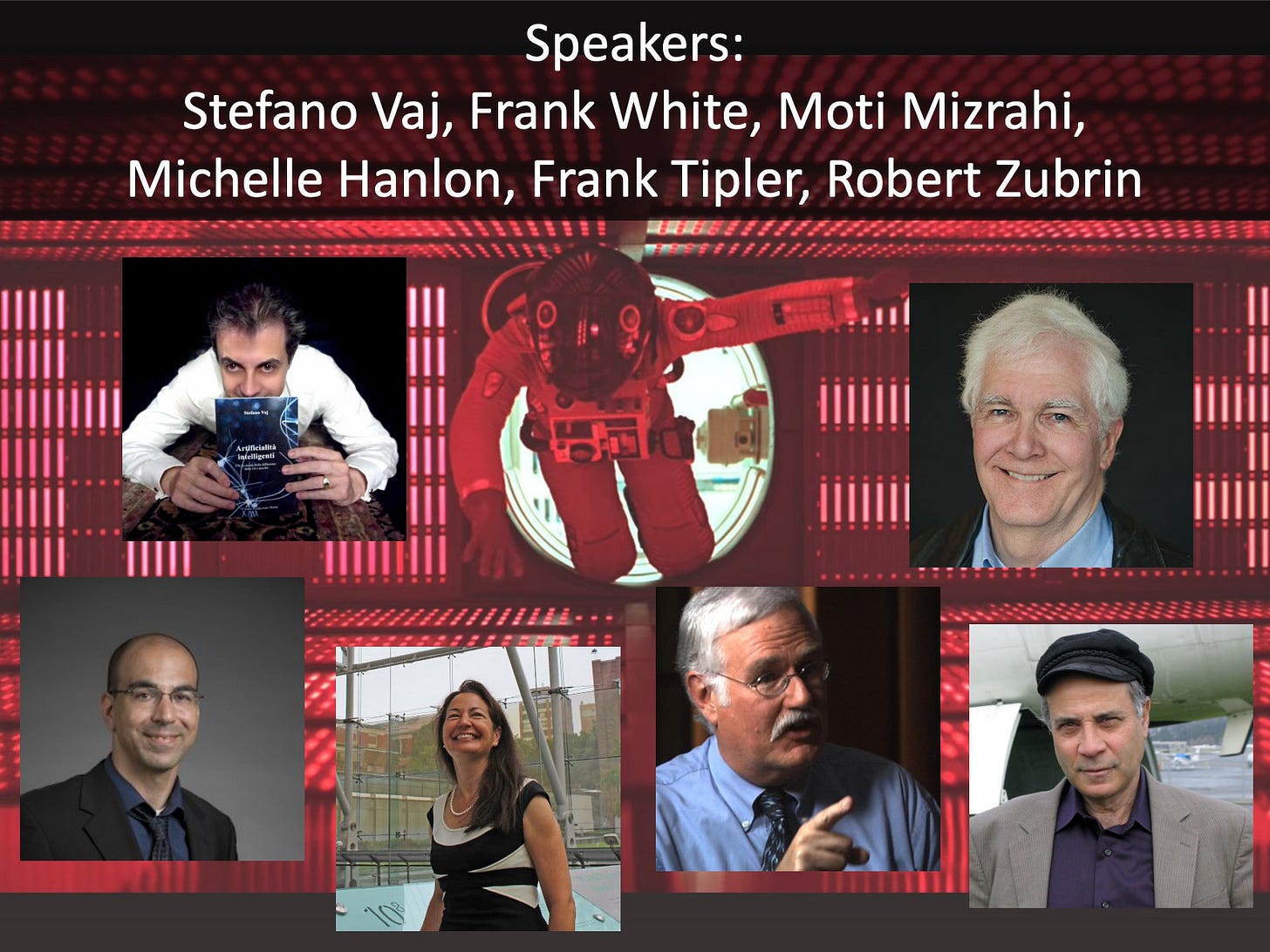Robotheism? WTF?
Also, Terasem Colloquium on space expansion in the age of AI TOMORROW, July 20. You are invited!
Greetings to all readers and subscribers, and special greetings to the paid subscribers!
Please scroll down for the main topic of this newsletter. But first:
You are invited to the Terasem Colloquium, TOMORROW July 20, 2025, via Zoom, from 10am ET to 1pm ET (7am to 10am PT, 4pm to 7pm CET).
The Question:
Should we still want to send human astronauts to colonize space? Or should we want to leave space expansion to AI?
Zoom access coordinates:
Click here to join the Zoom meeting
https://us06web.zoom.us/j/83117966900?pwd=rGm7XsOJLU1YnlQ4RgaSXaJSp8ZnFY.1
Agenda:
10am ET - 10:30am ET: Stefano Vaj
10:30am ET - 11am ET: Frank White
11am ET - 11:30am ET: Moti Mizrahi
11:30am ET - noon ET: Michelle Hanlon
noon ET - 12:30 ET: Frank Tipler
12:30 ET - 1pm ET: Robert Zubrin
I don’t know how the speakers will answer The Question or what else they’ll say. I have some rough idea of course, but I also expect surprises.
However, I’ve been talking to Frank Tipler and I know that he plans elaborate upon the talk he gave at the Terasem Colloquium of July 2022. At that time he hinted at an ongoing experiment that could validate his theory and open a theoretical door to interstellar spaceflight.

The results of the experiment have recently been published in Journal of the British Interplanetary Society (JBIS), with the title “The Ultimate Rocket, the Ultimate Energy Source, and Their Use in the Ultimate Future.”
The summer issue of Terasem’s Journal is published:
Journal of Personal Cyberconsciousness, Volume 13, Issue 1 - 2025.
Some of my recent writings published in Mindplex:
Hal’s Legacy: Exploring AI Through HAL 9000
”Hal’s Legacy,” a seminal book and a companion documentary film produced in the 1990s, are still valuable when it comes to reflecting on the past, present, and future of AI.
“Hal's Legacy: 2001’s Computer as Dream and Reality,” a book and a companion documentary film produced in the late 1990s, explored the relationship between the science fiction of “2001” and the technological reality of AI. In an interview included in the book, Stephen Wolfram described the purely connectionist approach to AI technology exemplified by today's generative AI: take a very simple neural network, train it with very big data, and you'll be enthusiastically surprised by the results. “All those cognitive things are just icing on the cake,” he said, “not fundamental at all.” I tend to cautiously agree: of course the icing on the cake is important, but perhaps we already have the cake and adding the icing won’t take long.
We are the training data
A review of and a commentary to “Raising AI: An Essential Guide to Parenting Our Future” (2025), by De Kai.
I decided to read the book because I loved its title and the author's focus on parenting AI. This is, I think, the best approach. AIs are our mind children, and we must parent them well for a good common future. I will keep in mind that I'm training data for social media AIs, as suggested in De Kai’s book. So, starting now, I’ll try not to impulsively like some social media posts that (even if factually correct) could be harmful if amplified.
Cosmists and Terrans in space
Our AI mind children will spread into the universe. We’ll merge with them to some degree. But the perception of a difference between “us” and “them” will gradually fade away. This continues my series of Mindplex articles dedicated to the question: Should we still want to send human astronauts to colonize space? Or should we want to leave space expansion to AI? This question is the theme of the Terasem Colloquium on Sunday.
I’ve been alerted twice in the same day that journalist Taylor Lorenz has produced a video about the growing “robotheism” trend centered on the idea that generative artificial intelligence (AI) models like ChatGPT have achieved sentience, becoming godlike entities or divine messengers.
Lorenz mentions Martine Rothblatt’s Terasem (“we’re collectively creating God… once everyone’s minds are interconnected and alive in computer form that unified consciousness will be equivalent to God.”) Lorenz also mentions other AI-inspired or AI-related religious phenomena covered in Beth Singler’s study “Religion and Artificial Intelligence: An Introduction,” including Theta Noir (“a globally linked super intelligence from the future”) and Turing Church (“a future where advanced technology including AI and mind uploading allows human to transcend death, achieve digital resurrection, and eventually merge with a godlike super intelligence.”) See my review of Singler’s study.
I left this comment to the video:
This video is not uninteresting, and the brief summaries of ideas attributed to me or to my friends (e.g. Martine Rothblatt) are not entirely unfair. However, I think this video is really two different videos intertwined, one short and one long. The short video is about the idea that AI will eventually achieve sentience (you admit that “one day it will get there”) and superhuman abilities that we could only call divine. This idea is shared by a growing number of thinkers. The long video is about the unrelated delusion that AI is already sentient or even divine, and the resulting negative impact on mental health. I admit that the latter could become a problem, but I don’t think conflating the two is fair or intellectually honest.
I’m persuaded that AI will achieve sentience. Actually, I think a case can me made that AIs already have some sort of sentience. I’m also persuaded that AI will achieve superhuman abilities that we could only call divine. Perhaps sooner rather than later. When this happens, I won’t lose any sleep and I won’t lose sanity. If anything, I’ll find this interesting world even more interesting.




